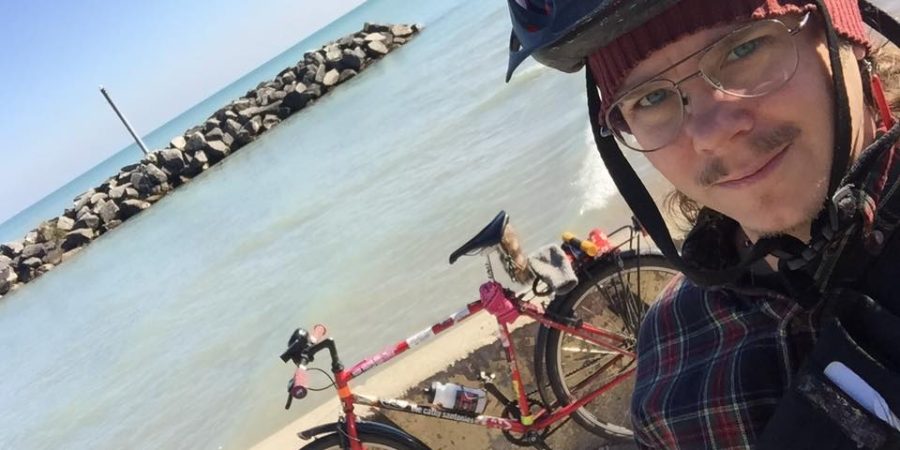Lee Dewey doesn’t believe in the gender binary and doesn’t want to be put in boxes. The 35-year-old Chicago resident was assigned female at birth and began their journey identifying as an agender child. As they grew up, they experimented with different identities, sometimes learning more toward the feminine, and other times more toward the masculine. Dewey eventually grew to reject labels and prefers to exist somewhere beyond the gender spectrum.
While Dewey often presents somewhat femme, they found that they often have to work to be visible, especially in the cold of Chicago, where it’s easy to blend in as a male in boxy winter wear. “My gender is ‘fuck you,’ to be quite honest,” Dewey says. “If I don’t, then I’m just invisible.”
Dewey has a passion for helping others who are often invisible or in need. They previously worked as an accountant at a credit union that focused on underserved communities. While there, Dewey created a loan product to help transgender and gender non-conforming people borrow money for gender-confirming surgeries, hormones, new wardrobes, and other financial needs, while helping them build credit.
They now work at the Recyclery Collective, a bicycle mechanic teaching shop on the North Side of Chicago that educates community members on how to repair their own bikes and gives away some for free to people in need.
Dewey also runs CommunityCave Chicago, a resource and support group for people assigned female at birth who identify as anything but cis. Since being diagnosed with HIV a few years ago, Dewey now also uses CommunityCave and other avenues to raise awareness about HIV prevention in communities rarely included in the conversation, especially among trans men.
Here is Dewey’s story of coming to reject the notion of binary gender, building community, fighting for visibility, and raising awareness about HIV/AIDS in vulnerable communities.
Profiles in Pride: What was your journey like to coming out as a gender non-conforming person?
Lee Dewey: Well, I sort of have an atypical sort of story, although I’m a big believer that every story is atypical. I think we’ve been boiled down to the singular trans narrative, when it’s sort of a fallacy. For myself, personally, I’ve been queer my entire life.
I was five years old, and I had a boyfriend and a girlfriend at the same time! So I’ve always been queer. I was always a tomboy – I was pretty agender. I didn’t really feel girly or anything like that. All my friends were boys, but I didn’t necessarily feel like a boy. I was just kind of neither.
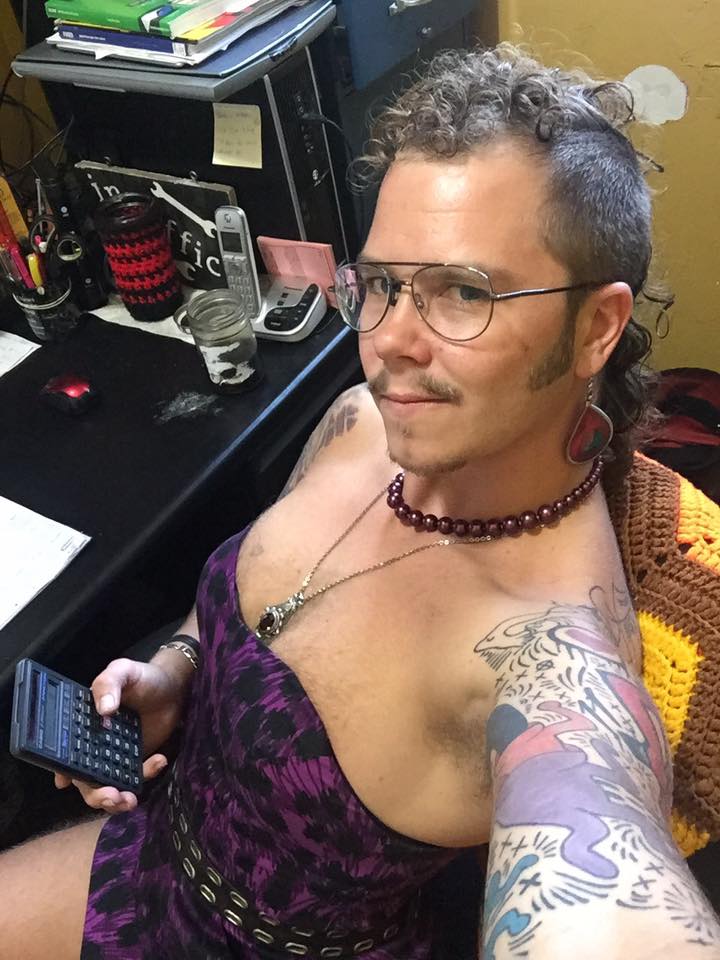
PIP: For clarification purposes, were you assigned female at birth?
LD: Yeah, I was assigned female at birth. So that was sort of my childhood, and after college, I really went full-tilt into my lesbian phase. I was like, “I’m not going to date boys anymore. I’m just going to date women. I’m gonna be a lesbian!” And I did that for a little while.
And then I was like, “Well, that was cool, but maybe I’ll just be a dyke. Yeah, that seems more like me.” So I transferred over to that sort of an identity. And then I met a partner that was a cis woman, but that was really versed in trans theory and things like that, and introduced me to My Gender Workbook by Kate Bornstein, and a bunch of theory around gender. My mind immediately recognized myself in it.
I’m sort of “this and that” in a lot of ways. Like mutually exclusive traits exist sort of in harmony within myself a lot of times.
So I just really clicked with this. But I was really perceived as a woman, and a female, so I started my journey to looking very transmasculine.
I had a long illness – I really have an atypical journey – I had a giant tumor on one of my cysts, so I was able to get a full hysterectomy right away, because I absolutely needed it. And then it was at that point that I started testosterone.
So I did this very trans-masc presentation thing, while not really identifying as a trans man. And that lasted a couple of years, until I started really blending in, and everybody was like, “Yeah, you look like a dude, you sound like a dude, you’re a dude.”
I was like, “No, I’m not.” And so that’s when I started really queering my presentation in a lot of ways. So I present very femme most of the time. And so now people have no idea. Actually, most people think I’m a trans woman.
PIP: How do people react to you? It’s so common to see gay and lesbian people, and the world is learning more about trans people, but most folks aren’t as familiar with gender non-conforming people. Has it been a challenge?
LD: Well, that’s sort of a yes and no thing. If I don’t try very hard to present as not male or not like a cis man, then I’m invisible and viewed as a cis man. I kind of hate the winter because I’m wearing all these boxy clothes like everybody else, and I’m just like a white dude for as long as there’s snow. I try to put a skirt on over all of the layers, and then they’re like, “Is that a kilt? OK, good day, Sir.” It’s harder for me to be sort of invisible, although I am much safer that way.
For most of the year, I’m wearing skirts and something pink and earrings and gender-fucking your perceptions of “what are you?” People often are just like, “What are you?” to me. They don’t know where I’m coming from or where I’m going, or where I want to be.
I don’t fit into any boxes, so I confuse people, and that looks like violence for a lot of people. It looks like a few beats before violence begins, sometimes. I’m often on my bicycle, so I’m faster than your momentary confusion until you react. Like, do you hate me? Do you want to know more? Do you want to know more and hate me? That’s all there.
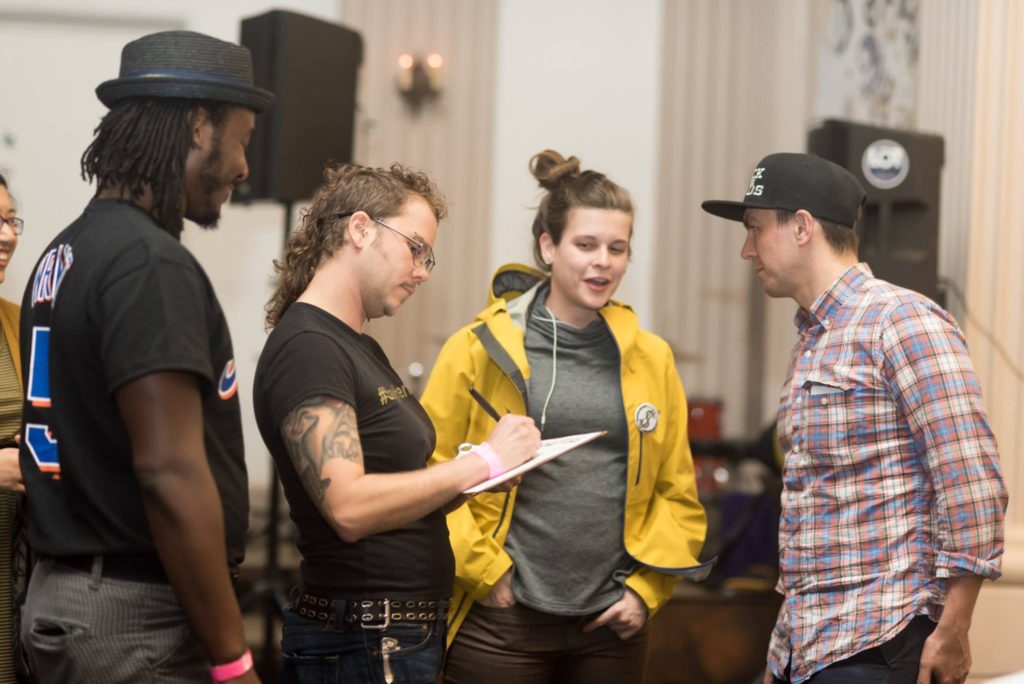
PIP: That’s tough that being visible as a gender non-conforming can also make the world a more dangerous place for you.
LD: It’s an oppressive system that we’re forced into, and we know that it’s a false binary because, number one, we have cis males and we have cis females, but we also have intersex, which is also like five other genders at least, maybe even 20 or 30, who knows?
So math tells you — I’m an accountant, so count the numbers there — “the binary” is false. Like two plus a bunch of other things. I just don’t want to be boxed in it. So in a lot of ways, my gender is sort of reactionary. Whatever way you see me or wherever you want to put me, that’s what I’m going to resist.
PIP: I love it. That makes a lot of sense. How has your family reacted to your identity?
LD: My nuclear family is incredibly supportive. My mother and my brother are amazing. I just met this long-lost sister that I didn’t know about until a year ago; she’s 23, she’s from Arizona, and she’s amazing. She’s uber supportive. For the most part, I’ve got a very, very large family, and most of them made it through the whole queer, gay thing, and then they made it through the trans thing for the most part. But most of them don’t speak to me anymore, but it’s because of my prison abolition and my police abolition politics, and I have a cop cousin. I found a way to lose them, just not because I’m trans! Haha.
PIP: Now I would love to learn about CommunityCave Chicago, which is a support group and resource you run. Can you tell us about it?
LD: It’s a community group for folks who are assigned or designated female at birth, and then identify as anything other than cis, and we provide a safer space for learning, meeting, organizing activities, education, and all of those things. We’re a community group. It’s everything from potlucks to protests. Every single Thursday we have a meeting at the Center on Halsted. Our first Thursday meetings are just for core membership, and they’re topic-driven.
And then we have Fuck Your Feelings second Fridays, which is a rotating activity jubilee. That one is a series of events that’s been everything like, it’s going to be a Stitch-n-Bitch thing this month, and we’ve had panel-led conversations from health professionals, we’ve had a meeting on homelessness, we’ve had all kinds of things on the non-feelings things.
And then we have TQI nights on the third Thursdays and CommunityCave Plus. So half of our meetings are open to anyone that’s trans, queer, or intersex. And the fourth meeting is open to our family, our partners, or whomever we want to bring in, too. I guess the point is, we’re sort of all of the things. It’s not just a community group for non-cis people who were assigned female at birth, though we do have safer space meetings just for us. We’re also intentionally inclusive of all folks that identify as trans, queer, or intersex.
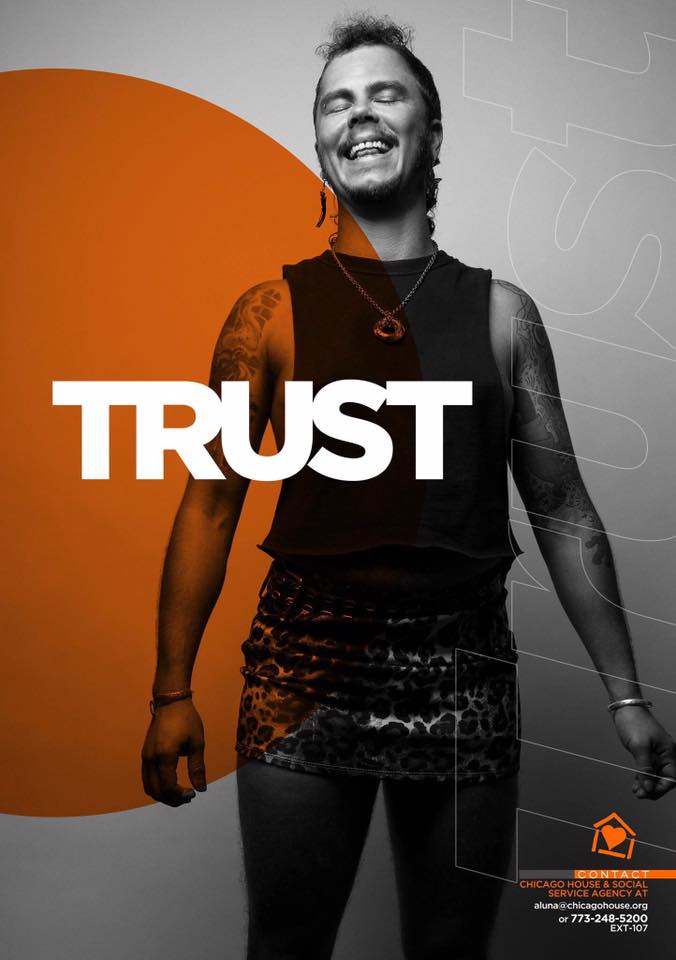
PIP: What a great resource. How did the program begin?
LD: Well, we have a murky origin story. Back in the day it was called Man Cave, which initially I was like, “well, that’s tongue-in-cheek enough, that’s cute.” It started as sort of an open format, 2.5 hours of dudes in a room together. When I found it, it was almost like a white boys’ club in a lot of ways.
It was just maybe five to 10 regular members, all fairly masculine-presenting and binary-identified, which isn’t problematic in itself, but that’s just what we looked like. And we met for a couple of years, and it was just a very core group that were basically friends and were just hanging out in a room at the center, before we went to the bar. We didn’t really attract a lot of new blood that way.
So when one of our organizers – our last organizer – moved out of town, I was one of the last two people that was going regularly, because I was kind of looking for something, and I sat in a room by myself for about a month and a half. We had meetings every two weeks then, so it was every other Friday, and I went, and I was like, “All right, well, nobody’s coming.”
So I said, well, I’m good at organizing things, and there was already this amazing group I had gone to for many years before that, called GenderQueer Chicago. It’s funny that I found myself in GenderQueer Chicago, and then I went to Man Cave. And then I was like, “No, I’m going to take this group and I’m going to make it just like GenderQueer Chicago.”
PIP: Very cool. So Lee, when we first met you, you were working as an accountant at North Side Community Federal Credit Union. You had created a gender-affirming loan product that might have been the first of its kind; can you talk a little about that?
LD: It was an entire product package that was specifically designed by and for trans people. But it wasn’t just about getting surgery. It’s about harm reduction in a financial way, so it’s everything from building your credit, to entering into the banking system for the first time, like getting a bank account, to getting small loans, or getting loans that might be paired with other funds that could help you get surgery.
PIP: And the funds can also go toward hormones, new wardrobe, and things like that, right?
LD: Yeah, and it wasn’t a surgery loan in the general context of what those are. You didn’t have to prove purchase, so there was no getting doctors and quotes beforehand. We were also not able to provide very large loans, so our loan cap made it about $6,000 to $10,000, depending.
It’s amazing. It’s still in existence. It’s an effort at harm reduction, and it’s important. I don’t regret the time I spent there creating it. I think it will be inspiration for a lot of similar products.
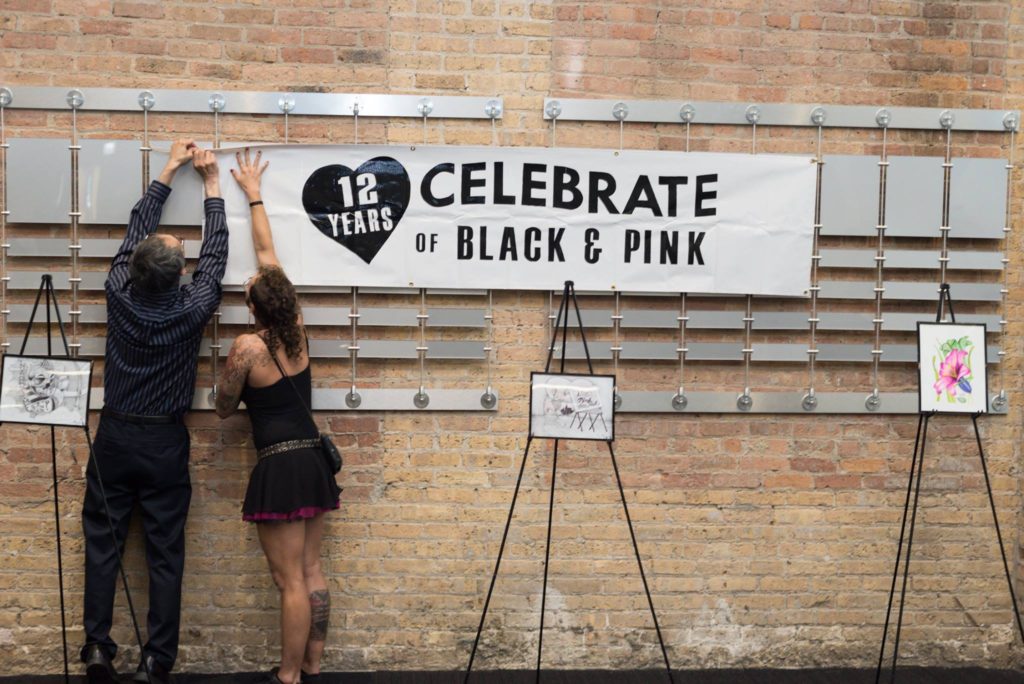
PIP: That’s wonderful. Is there anything else about you or your experience that you would like to share?
LD: Yeah, so my pet project is HIV education. I’m positive; I’ve been poz for a couple of years. I’ve always been an HIV and AIDS advocate. I’ve always tested – in my life, I’ve tested every three months. I have been very conscious about that, about safer sex practices. I’m very open with my doctors. I tell them exactly what kind of sex that I have with what kinds of people, that I’m non-monogamous and “popular,” so I’ve always been very open about my risk factors.
And I was having regular doctors appointments. I’d been was sick for a while, had some weird flu stuff going on, so I thought, I’ll just get an HIV test, because literally every time I’d go to the doctor, I did it.
I was out in the waiting room and I saw this brochure for PrEP, which is Pre-Exposure Prophylaxis, so that will prevent the contraction of HIV and in the instance of seroconversion – in the instance of being exposed to the virus. And I was looking at it and it mentioned that there were programs, so it was accessible. I could get it from Howard Brown where I was going, and I could get it for free, because I’m miraculously poor for some reason. So I realized I can have this, and I need it because I’m definitely at risk. So I went in and I was like, “Yo, Doc, I can have this. It says it’s free,” and she was like, “Definitely, we just need to do some tests.”
So we did a rapid test and I came up negative, and we were doing some other tests, and she was like, “Well, we’re just going to do a really full blood panel.” Then when I went into the phlebotomist, and there were like 20 vials out. I knew something was up, so we did a very, very full blood panel, and she stalled me into the office for a while. And then when she came back, she told me that I was already poz. I had just seroconverted, so I was too late for PEP, which is Post-Exposure Prophylaxis, and far too late for PrEP.
I felt a certain kind of way about it, and I’d been testing at places all over the city and really open about my risk factors, and no one ever thought to offer or tell me it was there.
I knew about Truvada, but I knew that it was expensive, and it just seemed unaffordable and glamorous to me. And so ever since that day, I’ve been doing advocacy around that for folks that are assigned female at birth. Trans men are specifically left out of research, out of education, out of the entire discussion around HIV and AIDS. It’s been getting a little bit better in the three years that I’ve been positive, but not much.
I’m literally viewed by the medical industry as lesbian, and at similar risk as lesbians are, that’s just the way we’ve been billed. There’s no research because you have to have numbers to get money to do research, and you have to have research to have numbers to get money, so we all know how that game goes. So I’ve just been screaming my head off about that ever since.
PIP: Do you use CommunityCave as a vehicle to help raise awareness about HIV/AIDS?
LD: Absolutely, yeah. At least once a quarter or every couple of months we have something, like we have free testing available at the Center at Halsted at certain times, and I’ll work with them to get free testing during meetings. We also often attend a monthly Poz meetup that happens at Touche.

